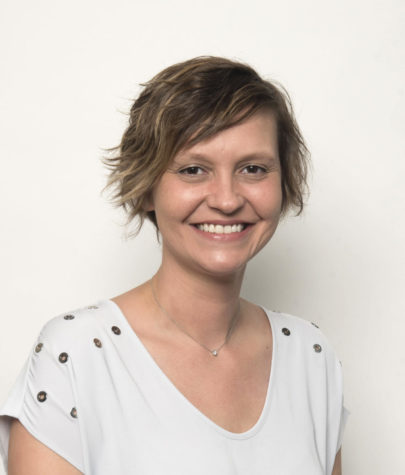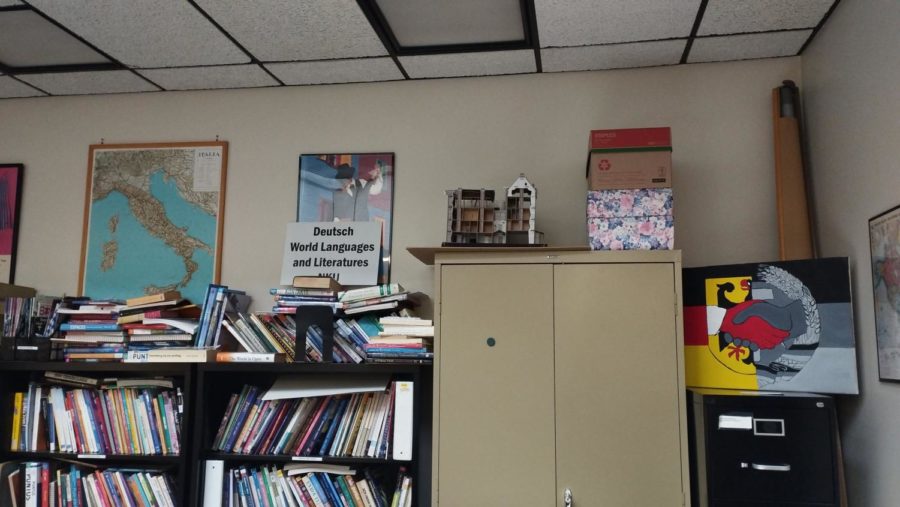NKU cuts only German lecturer
April 6, 2023
The Department of World Languages and Literature atrium on the fourth floor of the MEP building.
Starting in the fall, the German language program at Northern Kentucky University will lose its only faculty member. While the program will remain at NKU, uncertainty abounds as to what it will look like in the future.
Dr. Andrea Fieler, a non-tenure-track lecturer and Germany native who has been teaching German classes at NKU since 2009, will not be renewed for future semesters. But the news was not always so clear cut. When she came in for her performance review on Wednesday, March 15, she was informed that she was among the faculty members whose contracts would not be renewed due to budget cuts.
According to Fieler, the department chair asked the dean if this would spell the end of the German program. The answer was yes, Fieler said, believing that German would join Arabic, Italian and Korean in language classes no longer offered at NKU, leaving only Spanish, French and Japanese on the world languages’ catalog.
According to Caryn Connelly, chair of the Department of World Languages and Literature, Arabic, Italian and Korean have not been removed from the curriculum. However, they are not available for the 2023-2024 academic year due to low enrollment in the spring 102 level, the difficulty of finding part-time instructors who are both qualified to teach these languages and able to teach one course per semester at best, and the lack of job stability. Dr. Hilary Landwehr, a Spanish faculty member qualified to teach Italian, is retiring this semester, and the part-time Korean instructor Bo-Kyung Kirby will no longer be able to teach at NKU due to family obligations.
Thinking that the entire German program was to be eliminated, Fieler shared the news with her students and community partners who have engaged with the program.
“It is with great sadness that I inform you that the German Program will not continue in the fall. Please direct your questions towards the university,” Fieler wrote in a March 15 email to students enrolled in German courses.
In response, students, alumni and community members started writing letters to President Bonita Brown and other university administrators, seeking to change their minds.
“I made my decision to come to NKU very consciously based on its German and Japanese programs and how they compared to and outperformed other universities. With this decision to terminate Dr. Fieler, there is no longer a university for me to praise or be proud of,” wrote Isabella Bonner, a triple major in German, Japanese and international studies, in an email to the administration.
Fieler came to NKU as a part-time instructor in the fall of 2009. She started a full-time position as non-tenure-track temporary lecturer in Fall 2014 and has been a full-time non-tenure-track renewable lecturer since Fall 2020.
“If the decision cannot be reversed, I at least ask you to show your appreciation for your terminated language colleagues who have helped make NKU a great place to study and work by, for instance, giving emeritus status and severance pay to all terminated employees, tenure and non-tenure track,” wrote Lucian Rothe, assistant professor of German at the University of Louisville.
On March 17, Fieler informed the department chair of the email protests. The following Monday, March 19, Provost Matt Cecil announced at a Faculty Senate meeting that the German program would not face closure but was supposed to continue with adjunct faculty.
“Regarding German, French, and Arabic, we have not eliminated any academic programs and have no plans to do so,” the provost wrote in an email.
At the moment, the GER 101 (Elementary German I), 201 (Intermediate German I) and 294 (German for Professions) are still available on the course registration window for the fall, though with inconsistent seat offerings. The 001 sections of the GER 101 and 201 courses have only one seat each, which have already been taken. The 002 and 003 sections seem to offer seats as normal, but three of these classes are taught at local high schools and one at NKU has no instructor listed.
“I don’t currently see a path forward but German is not being removed,” Connelly said. “Dr. Fieler has worked so hard to build the German program and all of her effort hasn’t paid off: the numbers have only gone down, not up. It’s not her fault, it’s not anybody’s fault.”

According to Connelly, the German program in its current state has six majors and five minors. Out of this group of 11 students, five have already completed their program requirements and will be graduating this semester or in the fall, three are not progressing in their studies, leaving only three students for potential future classes.
There was a time when the German major had 18 or 19 students, Connelly recalled, but the yearly decline may have been accelerated by the COVID-19 pandemic and changing student behavior. Many college students and their parents opt for a degree that leads to a direct career path, such as computer science, healthcare and psychology. Language students enter a range of different fields when they graduate, but the career path is not as concrete.
The chair might explore the possibility of hiring a part-time instructor to help students complete their German education, though she fears it might not be viable with so few students per class. Classes with low enrollment are constantly at risk of cancellation, but world languages classes have been able to run with rosters of three to five students.
“It’s my duty as the chair of the language department to help them complete their requirement in this awful circumstance, but beyond that, there are not enough students for the program to be sustainable,” Connelly said.
Though she appreciates that students are speaking out, both from inside and outside of the German program, she questions the helpfulness of protesting students who did not continuously pursue or are not pursuing German courses for majors and minors.
“While I appreciate their speaking out, they’re not doing anything to actually help our numbers. That’s great that they’re doing that, but they’re also not contributing to the health and future of the program,” Connelly said.
Rachel Millward, a music education senior who is taking German 202 this semester, disapproves of the university’s handling of Fieler’s termination. With the program’s only lecturer gone, a lot of opportunities to cultivate cultural learning such as collaborations with the Haile Digital Planetarium and the Teaching Kitchen will be lost, she said.
Fieler is impressed that the community came together so quickly to protest the university’s decision, but she is worried that students of German would not be able to finish their education without the help of qualified instructors, and that students wanting to take German for general education would no longer have the option.
“My main concern is that we owe these students transparency and a plan. We have to give them a plan, not have them reach out,” Fieler said. “When we take your money, we have made a promise to you that you can get your degree here and not be shrugged off.”
Although she is not a German major or minor, Millward said she would probably continue to take German classes if given the choice. Given the low enrollment numbers she can see why the university chose not to renew Fieler, but she feels that they are letting go of valuable opportunities.
“[Fieler] doesn’t just teach language, she also teaches culture. She has a lot of passion that makes me want to go to the out-of-class engagement,” Millward said. “There’s a lot more to it than foreign languages and I think the university is losing a really good professor.”
As of the moment Fieler is not sure what she is going to do after NKU, other than embark on “new adventures.” She will continue to stay in touch with German alumni, however, via a group that meets Thursdays at the end of every month.
“I think it’s a bit bleak for humanities overall,” Fieler said. “I fear that we’re going to lose a lot over the coming years and I think we’ve just got to make sure that we are aware of what we are losing.”
Correction: The previous version of this article misstated the year Dr. Andrea Fieler started teaching at NKU. She has been teaching at NKU since 2009, not 2001. Additional information has been added regarding Arabic, Italian and Korean classes at NKU. The article has also been updated to clarify that faculty and students initially thought that the German program was going to be removed and that Fieler was being let go in the middle of the semester, which is not the case.

